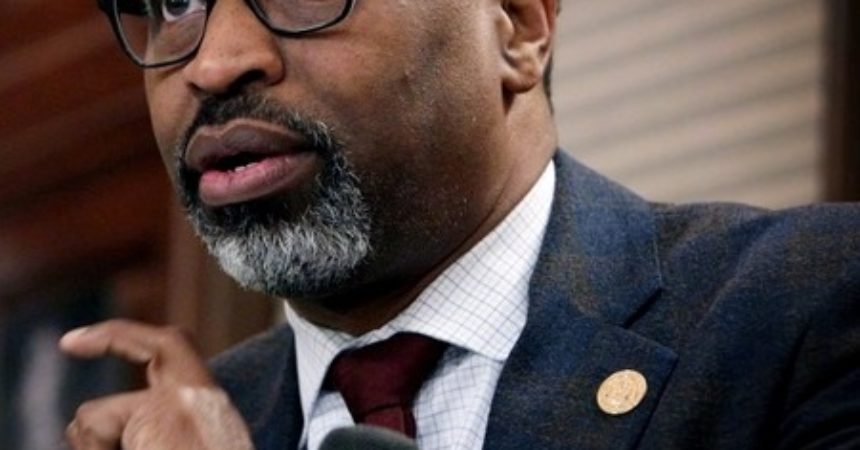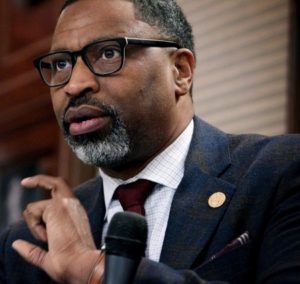
Amazon’s police power sounding alarms among Blacks and communities of color
By Hazel Trice Edney
TriceEdneyWire.com
It’s no secret that Amazon has been promoting DIY (Do It Yourself) surveillance products to consumers, such as its very own smart doorbell, Ring. But what Amazon shoppers and most everyday Americans are just starting to find out is that the real target customers for these surveillance tools are police departments and other law enforcement agencies – something that should have every person of color worried.
The little we know about Amazon’s surveillance technology is not good: it has been demonstrated to have racial and gender bias, and hacks have raised serious privacy concerns. As the lead local law enforcement officials, state attorneys general must suspend any partnerships with Amazon until we have more information, particularly with regards to how these technologies could impact communities of color.

NAACP President/CEO Derrick Johnson is among a string of racial justice advocates expressing concern over surveillance technology, including face recognition devices.
Photo by Sharon Farmer/Journalism Roundtable
Amazon has become a lightning rod for criticism as it attempts to tighten its grip around law enforcement practices. Dozens of social advocacy groups, including Human Rights Watch, Color of Change and Data for Black Lives have sounded the alarm over the consequences of allowing Amazon’s surveillance tools to wrongfully target groups that advocate for justice for people of color and others. Last year, Rekognition falsely matched 28 members of Congress with criminal mugshots, disproportionally representing people of color.
Without identifying a specific company, NAACP President/CEO Derrick Johnson recently called face recognition technology “a scary proposition.”
Johnson was responding to questions from veteran journalist, Dr. Barbara Reynolds, during Richard Prince’s recent Journalism Roundtable. Reynolds expressed concern over technology “so flawed” that it doesn’t even properly represent the faces of Black people.
Johnson said, concerning “face recognition technology specifically, we’ve talked to individual companies because that’s a scary proposition.” He noted that the NAACP has had ongoing discussions on the topic with the committees of Homeland Security in both the House and the Senate. “We’re in the middle of conversations with cyber experts so that we can have a very clear policy approach dealing with – not only facial recognition – but all of the technology and how it can be used in our community against us.”
Meanwhile, researchers from Google, Facebook, and Microsoft have all urged Amazon to stop selling Rekognition software to law enforcement, citing study after study that show the company’s surveillance tools simply cannot be trusted.
And what has Amazon done to address these serious allegations about racial profiling from its surveillance tools? Quietly tell law enforcement officials not to use the words “surveillance” when talking about Amazon products in public.
It is overwhelmingly clear that Amazon’s facial recognition technology is not only deeply flawed, but has the grave potential to magnify our worst racial biases if we continue to allow it to dictate policing.
Amazon’s Neighbors application similarly has put Black people and other people of color at unfair risk of being targeted by law enforcement officials. Earlier this year, one review found that neighborhood watch groups using Ring footage disproportionately accused people of color of suspicious activity under the guise of law and order. Moreover, these videos are frequently accompanied by racist and verbally abusive language, demonstrating the threats these technologies pose.
Sometimes lawmakers can even be left in the dark as Amazon strikes shadowy backroom deals with local law enforcement agencies. For example, Palantir — a notorious data analytics software company hosted on Amazon Web Services that has drawn fierce backlash from hundreds of Amazon employees for its connection with immigration deportations — was secretly used by the New Orleans Police Department and was accused of overwhelmingly targeting young African-American men while having virtually no impact on reducing crime.
All of this should be setting off alarms for lawmakers and putting Black communities on high alert. For his part, Senator Bernie Sanders recently came out in support of a ban on police using facial technology. But much more must be done.
Giving incredibly invasive tools like Neighbors or Rekognition a greater role in our justice systems poses a threat to anyone who wants to walk the streets without the fear of being tracked and falsely targeted.
We must protect our communities of color before Amazon’s dangerous surveillance technologies become fully entrenched in our criminal justice system. All state attorneys general must immediately investigate any partnership with Amazon and bring to light how they are targeting communities of color.







